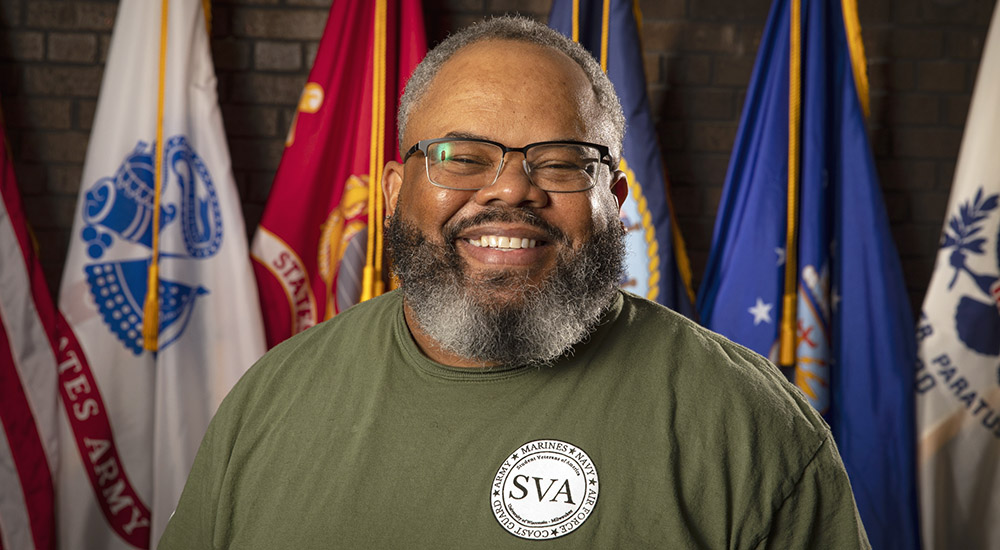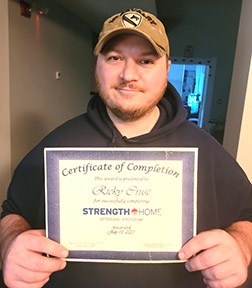For James “Groovy” Cocroft, May 3, 2020, wasn’t so groovy.
Nicknamed Groovy by his aunt because he rarely cried as a child, Cocroft, 52, found himself at wit’s end on that day in May.
“I was arguing, having issues with my family,” Cocroft said. “I wasn’t able to think clearly. Nothing could bring me down.”
The incident made him realize he needed help. He soon found exactly what he needed in VA’s Strength at Home program, which is targeted to Veterans struggling with conflict and anger in intimate relationships.
Over the course of 12 weeks, Veterans meet in small groups and learn how to diffuse conflict, understand their anger and communicate more effectively. This includes knowing when to take a timeout during an argument, using “I” statements to better express feelings, and learning how to be assertive instead of aggressive when communicating. The program also covers verbal and nonverbal communication, showing appreciation, active listening, empathy, encouraging compromise and conflict resolution.
He and his family saw immediate positive results
A key part of the program is the exercises the participants are given to try out at home and in other situations where communication becomes strained. That “homework” can be transformative. It was for Cocroft, the smiling Veteran at the top of this blog post.
“It was amazing,” he said. “I was able to communicate without that negative tone. When you put those practices into play, it actually works. Strength at Home helps you process a lot of different things so you don’t get into those situations. And if you do, it gives you methods to diffuse them.”
Cocroft said he and his family saw immediate, positive results from the program.
“My family said, ‘You’ve changed a bit.’ I’m happy to hear that,” he added. “It worked, but I have to work on it every day.”
One more step
For Army Veteran Ricky Cruse, the Strength at Home program is one more step on a long path as he attempts to get his life back.
In April 2020, he was awash in post-traumatic stress, depression, anxiety and alcoholism. And it was tearing his family apart.
So he tried to kill himself with a firearm.
He failed, but after his recovery, he was jailed for five months and was facing numerous charges related to the suicide attempt, even though it happened away from his family and no one was endangered by it, he said.
His journey brought him to Milwaukee VA, where he has gone through numerous programs to address his PTSD, curb his alcoholism – he’s been sober for more than 18 months – and hopefully repair his family.
That last hurdle is the highest. His wife is seeking a divorce and he has been unable to see his children, ages 4, 6 and 8.
Program helps him navigate choppy waters
Cruse enrolled in Strength at Home so he could better learn to communicate his feelings and needs without pointing fingers and getting angry.
“It helped me communicate in a better way,” he said. “I think things through more, and if something isn’t going well, I take a timeout and then respond.”
Cruse said the program helped him understand his emotions.
“If I’m angry, that’s just the tip of the iceberg,” he said. “The question is, ‘Why am I angry? Why am I sad?’ Being aware of that, I’m better able to deal with it.”
While the legal proceedings of his case and his pending divorce are sometimes vexing, Cruse said the skills he learned through Strength at Home have helped him better navigate those choppy waters.
“Strength at Home teaches me how to communicate in a better, nonviolent way, and it helps me be a better person. And that’s what I want to be for my children,” he said.
Supporting relationship wellness
The above outcomes are two of many that Andrea Knowlton has seen since launching Strength at Home at the Milwaukee VA about a year ago.
“Most people want a healthy relationship. They just don’t know how to do it,” said Knowlton, the Intimate Partner Violence Assistance Program coordinator. “With Strength at Home they can learn how to do it better.”
While everyone can learn from the skills taught through Strength at Home, the program addresses the unique needs of Veterans. Some may be coping with PTSD, but for others, they need to learn a different way to communicate than what they learned growing up or in the military.
Veterans often feel the need to react quickly and forcefully, Knowlton added. And that isn’t always the best response when dealing with a spouse or intimate partner. And many don’t want to show emotion or examine their feelings.
“I’m telling them the opposite,” she said. “It’s OK because it enhances your relationship. Improving communication and expressing our feelings builds intimacy and trust in a relationship. Having a healthy relationship is a process. I don’t think there’s a start and end. It’s continuous. And using these skills can drive change in a relationship.”
Cocroft can attest to that. He said he uses the skills learned through Strength at Home every day.
“My home life is 180 degrees from where it was before,” Cocroft said. “I’m able to communicate with my wife and kids. And I use the same skills interacting with other people as well. It helps me daily.
Cruse agreed.
“It was well worth it,” he said. “I think it helped me a lot. I’m grateful for it and recommend it to anyone who want to work on their communication.”
Topics in this story
More Stories
The Medical Foster Home program offers Veterans an alternative to nursing homes.
Watch the Under Secretary for Health and a panel of experts discuss VA Health Connect tele-emergency care.
The 2024 National Veteran Suicide Prevention Annual Report provides the foundation for VA’s suicide prevention programs and initiatives.







